
Aylesbury is the county town of Buckinghamshire, South East England. It is home to the Roald Dahl Children's Gallery and the Waterside Theatre. It is located in central Buckinghamshire, midway between High Wycombe and Milton Keynes.

Haddenham is a village and civil parish in west Buckinghamshire, England. It is about 5 miles (8 km) south-west of Aylesbury and 4 miles (6 km) north-east of Thame in neighbouring Oxfordshire. At the 2011 Census, the population of the civil parish was 4,502.

Dinton is a village in Buckinghamshire, England, within the Buckinghamshire Council unitary authority area. It is in the south of the Aylesbury Vale on the ancient turnpike leading from Aylesbury to Thame. It is within the civil parish of Dinton with Ford and Upton. The village name is Anglo Saxon in origin, and means 'Dunna's estate'. In the Domesday Book of 1086 it was listed as Danitone.

Fleet Marston is a civil parish and deserted medieval village in the Aylesbury Vale district of Buckinghamshire, England, about 2.5 miles (4 km) northwest of the centre of Aylesbury. The parish measures about 2.5 miles (4 km) north – south, but east – west it is nowhere more than about 3⁄4 mile (1.2 km) wide. It is bounded to the southeast by the River Thame, to the east by a stream that joins the Thame, and to the west by field boundaries. It has an area of 934 acres (378 ha).

Hartwell is a village and former civil parish, now in the parish of Stone with Bishopstone and Hartwell, in central Buckinghamshire, England. It is to the south of Aylesbury, by the village of Stone. In 1971 the civil parish had a population of 102. On 1 April 1986 the parish was abolished and merged with Stone to form "Stone with Bishopstone and Hartwell".

Mentmore Towers, historically known simply as "Mentmore", is a 19th-century English country house built between 1852 and 1854 for the Rothschild family in the village of Mentmore in Buckinghamshire. Sir Joseph Paxton and his son-in-law, George Henry Stokes, designed the building in the 19th-century revival of late 16th and early 17th-century Elizabethan and Jacobean styles called Jacobethan. The house was designed for the banker and collector of fine art Baron Mayer de Rothschild as a country home, and as a display case for his collection of fine art. The mansion has been described as one of the greatest houses of the Victorian era. Mentmore was inherited by Hannah Primrose, Countess of Rosebery, née Rothschild, and owned by her descendants, the Earls of Rosebery.

Stone is a village and former civil parish, now in the parish of Stone with Bishopstone and Hartwell, in Buckinghamshire, England. It is located southwest of the town of Aylesbury, on the A418 road that links Aylesbury to Thame. Stone with Bishopstone and Hartwell is a civil parish within Buckinghamshire district and also incorporates the nearby settlements of Bishopstone and Hartwell.

Hadlow Castle was an 18th-century country house in Hadlow, Kent, England, built in the fashionable Strawberry Hill 'Gothic' style. The house was gradually enlarged and extended during the 19th century and finally demolished in the 20th, apart from a prospect tower and ancillary buildings. The surviving Grade I Listed Hadlow Tower, locally known as May's Folly, was restored in 2013.
Aylesbury was a rural district in the administrative county of Buckinghamshire, England from 1894 to 1974. It was named after but did not include Aylesbury, which was a separate municipal borough.
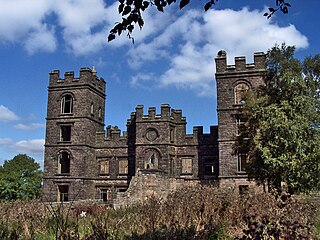
Riber Castle is a 19th-century Grade II listed country house in the hamlet of Riber on a hill overlooking Matlock, Derbyshire. It is built of gritstone from a local quarry which was pulled up the 200-metre (660 ft) hill by a series of pulleys.
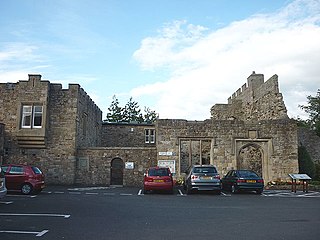
Blenkinsopp Castle is a fire-damaged, partly demolished 19th-century country mansion, incorporating the ruinous remains of a 14th-century tower house, which is located above the Tipalt Burn approximately one mile south of Greenhead, Northumberland, England. It is a Grade II listed building; it is also a Scheduled Ancient Monument as one of the "surviving tower houses retaining significant medieval remains".
Detmar Jellings Blow was a British architect of the early 20th century, who designed principally in the arts and crafts style. His clients belonged chiefly to the British aristocracy, and later he became estates manager to the Duke of Westminster.
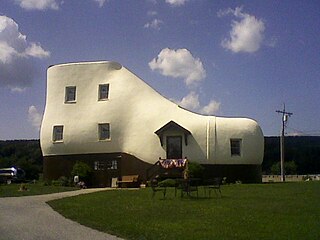
The Haines Shoe House is a shoe-shaped house in Hellam Township, Pennsylvania, about two miles west of the borough of Hallam, on Shoe House Road near the Lincoln Highway. The house is 25 feet (7.6 m) high, 17 feet (5.2 m) wide, and 48 feet (15 m) long, and is visible from US Route 30.
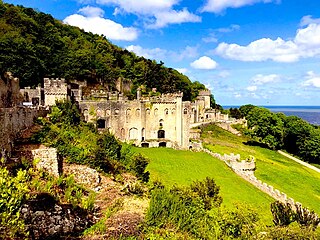
Gwrych Castle is a Grade I listed country house near Abergele in Conwy County Borough, Wales. On an ancient site, the current building was created by Lloyd Hesketh Bamford-Hesketh and his descendants over much of the 19th and early 20th centuries. The castle and its 236-acre estate are now owned by a charity, the Gwrych Castle Preservation Trust.

Betchworth Castle is a mostly crumbled ruin of a fortified medieval stone house with some tall, two-storey corners strengthened in the 18th century, in the north of the semi-rural parish of Brockham. It is built on a sandstone spur overlooking the western bank of the River Mole in Surrey in England.

Dropmore Park is a private estate located along Dropmore Road, north of Burnham, Buckinghamshire, England, about 220 acres (89 ha) in size. The park with its buildings, including Dropmore House, have Grade I listed building status. Dropmore House is one of the most important buildings in south Buckinghamshire.

Seton Castle or Seton Hall is an 18th-century Georgian castle-style house in East Lothian, Scotland. The house was Robert Adam's final project in Scotland.

Pencoed Castle is a ruined Tudor mansion, largely dating from the 16th century, in the parish of Llanmartin, now within the city of Newport, south Wales. It is located about 0.5 miles (0.80 km) east of Llanmartin village, and 0.5 miles (0.80 km) south-east of Llandevaud, at the end of a farm lane.
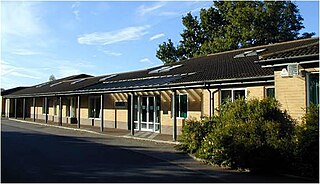
The PACE Centre is a UK-registered charity and special school based in Aylesbury, Buckinghamshire, UK. It helps children and young people with motor disorders, such as cerebral palsy.

Buckinghamshire Council is the local authority for the non-metropolitan county of Buckinghamshire in England. It is a unitary authority, performing both county and district-level functions. It was created on 1 April 2020, replacing the previous Buckinghamshire County Council and the councils of the four abolished districts of Aylesbury Vale, Chiltern, South Bucks, and Wycombe. The non-metropolitan county is smaller than the ceremonial county, which additionally includes Milton Keynes.


















